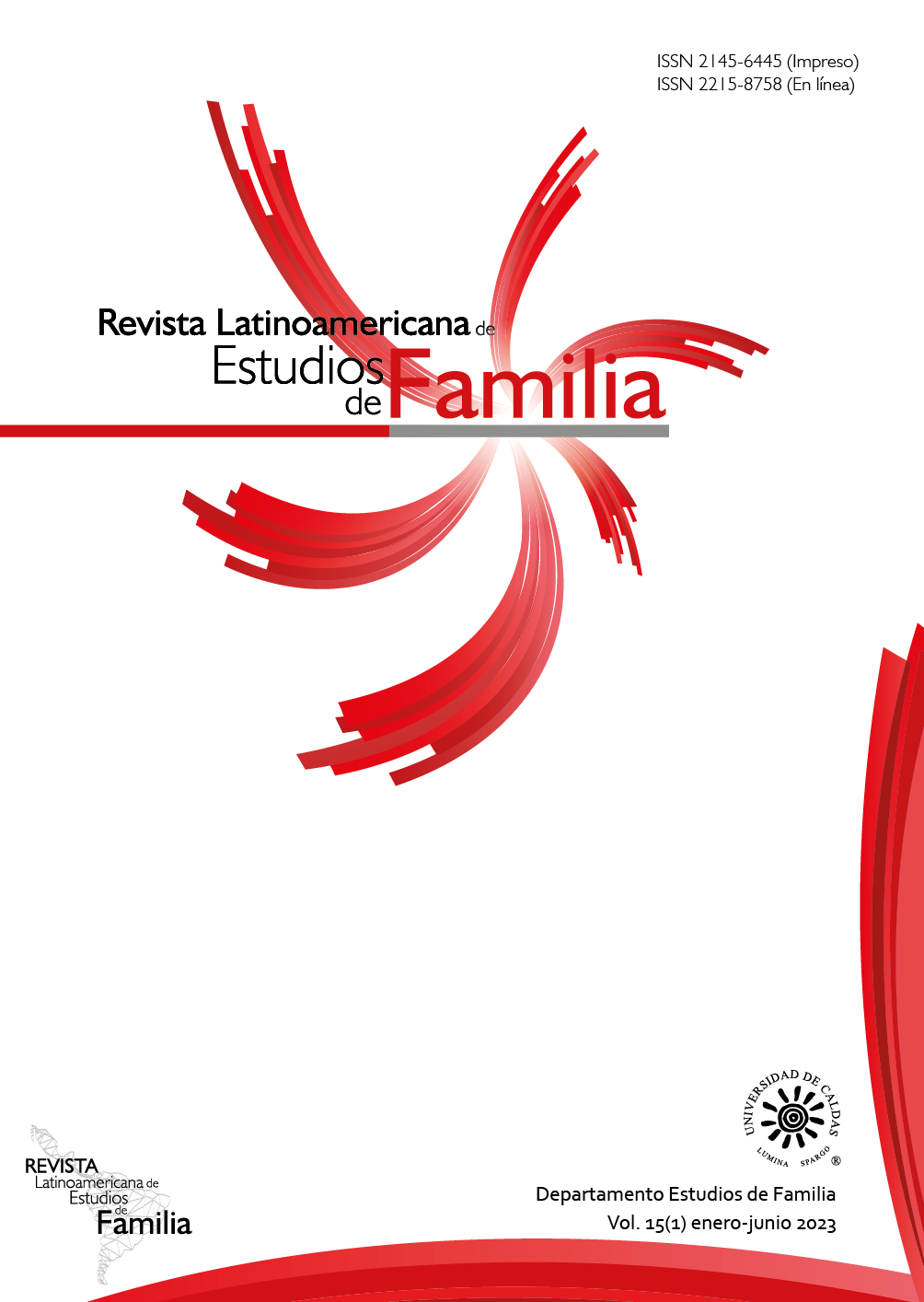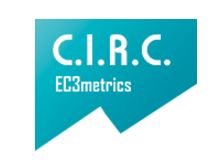Autores/as
Resumen
Resumen. Este artículo es el resultado de la realización de un estado del arte de los trabajos de grado (en adelante TG) de la Maestría en Intervención en Relaciones Familiares de la Universidad de Caldas, entre los años 2013 y 2020. El objetivo general fue recuperar el conocimiento acumulado a partir de la trayectoria los procesos investigativos y de intervención realizados en la Maestría. La metodología comprende una revisión sistemática, documental de las tesis de la Maestría para indagar y recopilar información acerca de los estudios realizados en el campo de las relaciones familiares y los procesos de intervención en el transcurso de ocho años académicos. El registro de información fue complementado con entrevistas a profundidad a seis directoras-es y diez autoras-es de las tesis, con el fin de identificar ejes centrales, elementos comunes, similitudes y diferencias. El análisis de este artículo da cuenta del énfasis en las posturas teóricas, objetos de conocimiento, ejes temáticos, procesos metodológicos, conclusiones y recomendaciones de los TG, las voces de las-os egresadas-os y las-os directoras-es. Los resultados y las conclusiones muestran a) las tendencias y los avances epistemológicos, teóricos y metodológicos de los estudios investigativos, b) la relación que hay entre los TG en cuanto a sus ejes temáticos o problemáticos con las funciones laborales unidas a las necesidades institucionales y profesionales de las-os autoras-es y a la pertinencia con semilleros o líneas de investigación a la cual pertenecían, y, c) la conexión del TG con propuestas articuladas a las instituciones. Esto último, ha sido una oportunidad de continuar desarrollando procesos con el soporte de los lineamientos de la propuesta de intervención. No sucedió lo mismo con quienes presentaron este proceso solamente como un requisito para obtener el título. Finalmente, y como conclusión de cierre, en el desarrollo del artículo se cruzan las epistemologías: sistémica, constructivismo sociocultural y construccionismo social, las cuales responden tanto a los planteamientos la Maestría, como a la invitación metodológica de la intervención que propone el programa académico para afrontar con las familias los problemas sociofamiliares por los cuales consultan.
Citas
Ayarza, Y., Villalobos, S., Bolívar, L., Ramos, N., Rentería, K., Arias, A. M., & Vanegas, M. (2014). Families in Urabá: State of the Art on Families, Typologies, Upbringing and Their Transformations. Education and Humanism, 16(27), 87-103. http://revistas.unisimon.edu.co/index.php/educacion/article/view/2336
Bonilla, N., Alarcón, M., & Sánchez, G. (2016). Family: A State of the Art in Colciencias Research Groups in Psychology between 2010-2015. MundoFesc, 11, 33-47. https://www.fesc.edu.co/Revistas/OJS/index.php/mundofesc/article/view/80
Callejas, A. (2018). Meanings of family conflicts and changes associated with the use of psychoactive substances[Master’s Thesis Universidad de Caldas].
Calvo, G. & Castro, Y. (1995). The family in Colombia. A State of the Art of Research 1980-1994. Colombian Institute for Family Welfare
Calvo, G. (2017). Discourses and practices of action in families that experienced child sexual abuse [Master’s Thesis Universidad de Caldas].
Cardona, Y. (2017). Meanings of the polyamorous or open partner experience and their experience in the family relationships of origin [Master’s Thesis Universidad de Caldas].
Charry-Higuera, M. (2014). Approach to the state of the art of family studies in Colombia. An approach from social work. Prospective,19, 387-415. https://doi.org/10.25100/prts.v0i19.979
Duarte, J., Zapata, L. P. & Rentería, R. (2010). Family and Early Childhood: A State of the Art. 1994 / 2004. Pedagogical Studies,36(1),107-116. http://dx.doi.org/10.4067/S0718-07052010000100005
Duarte, M. (2019). Family experiences and teenage pregnancy with three families in the municipality of Chinchiná [Master’s Thesis Universidad de Caldas].
Figueroa, L. (2019). Systematization of social work in the intervention in family relationships in the process of restoration of ICBF law [Master’s Thesis Universidad de Caldas]
Garzón, L. (2019). The role of the surrogate father in the process of raising adolescents with cognitive disabilities, belonging to the modality surrogate homes with disabilities or special care illness, of the Colombian Institute of Family Welfare operated by the Corporación Ceder, Manizales – Caldas. [Master’s Thesis Universidad de Caldas].
Gergen, K. (1996). Realities and relationships. Approaches to social construction. Paidós.
Gergen, K. & Warhus, L. (2001). Therapy as a Social Construction: Dimensions, Deliberations, and Divergences. Family Systems, 17(1), 11-27. http://www.dialogosproductivos.net/img/descargas/27/15042009113127.pdf
Gergen, K. (2007). Social constructionism Contributions to debate and practice. Uniandes.
González, A. (2016). Resignification of family relationships during family coping with childhood cancer [Master’s Thesis Universidad de Caldas].
González, G. (2019). Social Survival Strategies in Displaced Families: Rebuilding Life in a New Territory [Master’s Thesis Universidad de Caldas, Manizales].
López, L. M. and Herrera, G. (2017). A State of the State of Family Art in Colombia: The Place of Family and Disciplines. Revista Latinoamericana de Estudios de Familia, 9, 148-164. https://revistasojs.ucaldas.edu.co/index.php/revlatinofamilia/article/view/3086
Martínez, C. (2017). Meaning assigned by families to family socialization processes in early childhood, based on the presence and use of information and communication technologies in family settings [Master’s Thesis Universidad de Caldas].
Martínez, N. (2018). Dialogic creations in psychosocial intervention that generate capacity for coping and change in the face of child sexual abuse within the family [Master’s Thesis Universidad de Caldas].
Mejía, N. (2020). Family interactions, when one of its members is a transsexual woman: in the municipality of Villamaría [Master’s Thesis Universidad de Caldas].
Morales, D. L. (2014). State of the art of family research in the universities that offer the psychology program in the city of Ibagué. [Bachelor´s Thesis UNAD]. https://repository.unad.edu.co/handle/10596/3491
Ortiz, A. (2019). Parenting practices in the prevention and exposure to risk behaviors in boys and girls [Master’s Thesis Universidad de Caldas].
Páez, R. (2017). Research trends on the family in Colombia. An educational perspective. Revista Latinoamericana de Ciencias Sociales, Niñez y Juventud, 15(2), 823-837. https://doi.org/10.11600/1692715x.1520331052016
Puerta, M. (2019). Communication in families of adolescents linked to the criminal responsibility system, supervised release modality: in the municipality of Armenia – Quindío [Master’s Thesis Universidad de Caldas].
Rodríguez, A. (2017). Family tensions and coping with lesbian identity in the mother-child relationship [Master’s Thesis Universidad de Caldas].
Rojas, S. (2019). Care practices in grandparent relationships with school-age boys and girls from the market place in the city of Manizales [Master’s Thesis Universidad de Caldas].
Sánchez, L (2019). The sense of family in the higher education scenario [Master’s Thesis Universidad de Caldas].
Sánchez, M. H. (2000). States of the art on family violence from a systemic perspective in five cities of the country: Medellín, Santafé de Bogotá, Santiago de Cali, Barranquilla and Cartagena 1987-1997. Universidad de Caldas. [Unpublished].
Sánchez, R. del S. (2007). State of the art of research of the Department of Family Studies 1996-2005. [Unpublished].
Sánchez, M. H. (2013). Therapeutic conversations that accompany sociolinguistic transformations in socio-family relationships. Latin American Family Studies, 5, 160-185. https://revistasojs.ucaldas.edu.co/index.php/revlatinofamilia/article/view/4624
Sánchez-Jiménez M. H. (2014). Therapeutic conversational movements from problem to change and sociolinguistic creations. Latin American Family Studies, 6, 191-210. https://revistasojs.ucaldas.edu.co/index.php/revlatinofamilia/article/view/4155
Sánchez, M. H. (2015). Systemic-Constructionist Family Therapy. Socio-linguistic logics that co-direct. In D. Fried Schnitman (Ed). Dialogues for Transformation: Experiences in Therapy and Other Psychosocial Interventions in Latin America (Vol. 1, pp. 105-127). Taos Institute Publications/ WorldShare Books.
Sánchez, M. H. (2016). Sociolinguistic movements in therapeutic conversations. Towards the languages of change. University of Caldas.
Serrano, J. M. & Pons, R. M. (2011). Constructivism Today: Constructivist Approaches to Education. Redie, 8 (1). http://redie.uabc.mx/vol13no1/contenido-serranopons.html
Valenzuela, C. (2019). Practices of family accompaniment of educational agents and psychosocial professionals in the modalities of early childhood care of ICBF. 2010 – 2017 municipality of Dosquebradas – Risaralda[Master’s Thesis Universidad de Caldas].
Vargas, I. (2018). Social Construction of Emotions in the Context of International Maternal Migration: An Approach from Family Narratives. Universidad de Caldas.
Vargas, L. (2018). Peacebuilding families in scenarios of conflict and violence [Master’s Thesis Universidad de Caldas]

 PDF (English)
PDF (English)
 FLIP
FLIP


























